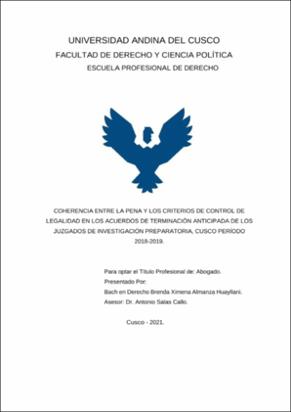| dc.contributor.advisor | Salas Callo, Antonio | |
| dc.contributor.author | Almanza Huayllani, Brenda Ximena | |
| dc.date.accessioned | 2022-05-09T15:21:51Z | |
| dc.date.available | 2022-05-09T15:21:51Z | |
| dc.date.issued | 2021-12-23 | |
| dc.identifier.uri | https://hdl.handle.net/20.500.12557/4566 | |
| dc.description.abstract | La presente investigación determinó que en los Juzgados de Investigación
Preparatoria del cercado de Cusco, se llegan a aprobar Acuerdos de Terminación
Anticipada sin efectuar el control de la legalidad de la pena, ya que, dada la
determinación, quien representa al ministerio público llega a incurrir en
equivocaciones, las cuales no fueron analizadas por el Juez, pero sí fueron
convalidadas, de forma exacta: se identifica a la pena básica fijándose una
intermedia respecto a la conminada del delito, en el proceso para determinar las
penas concretas de varios casos, se utilizan circunstancias genéricas del artículo 45
y 46 del Código Penal, sin que se fundamenten el porqué de las consideraciones
teniendo agravantes, sin embargo en otros casos solo se mencionaron sin darles
algún valor que fueron usados en las circunstancias sin ser reguladas de acuerdo a
la norma.
Por otro lado, las circunstancias que llegaron a modificar las responsabilidades
penales no se tomaron en cuenta, lo que afectó la pena previamente determinada al
momento que correspondía, así mismo se consideró que para los casos del
concurso real de delitos se tuvo que identificar las penas básicas así como sus
correspondientes penas para cada delito referentes a los concursos, seguidamente
se procediera a realizar una sumatoria de 2 penas parciales que hayan sido
determinadas; además, se utiliza las confesiones como circunstancias atenuantes
para que se determine la pena básica, sin que se tome en cuenta que la misma viene
a ser la circunstancia cualificada que permitirá reducir el marco conminatorio mínimo,
en el momento en el que se identifique la pena básica. Para finalizar se hizo una
advertencia respecto a la aplicación que tiene el beneficio para la reducción de una
sexta parte de la pena concreta inadecuadamente determinada, llevando a probar
inadecuadamente los acuerdos. | es_PE |
| dc.description.abstract | The present investigation was determined in the Preparatory Investigation Courts of the
Cercado of Cusco, where agreements of Early Termination are approved without carrying
out the control of the legality of the penalty, since, given the determination, who represents
the Public Prosecutor’s Office makes mistakes, which were not analyzed by the Judge, but
were validated, exactly: the basic penalty is identified by setting an intermediate penalty
for the commission of the offence, so that there is no legal mechanism, in the process of
determining the specific penalties for several cases that generic circumstances of Articles
45 and 46 of the Criminal Code are used, without substantiating the reasons for the
aggravating considerations, however in other cases they were only mentioned without
giving them any value that were used in the circumstances without being regulated
according to the rule.
On the other hand, the circumstances that led to a change in criminal responsibilities were
not taken into account, which affected the sentence previously determined at the
appropriate time, likewise it is considered that for the cases of the real contest of offenses
the basic penalties as well as their corresponding penalties for each crime related to the
contests had to be identified, then add 2 partial penalties that have been determined in
addition, confessions are used as mitigating circumstances for the determination of the
basic penalty, without taking into account that this is the qualified circumstance that will
allow to reduce the minimum penalty framework, the moment the basic penalty is
identified. Finally, a warning was issued regarding the application of the benefit for the
reduction of one-sixth of the specific sentence inadequately determined, leading to
improperly proving the agreements. | en_US |
| dc.format | application/pdf | es_PE |
| dc.language.iso | spa | es_PE |
| dc.publisher | Universidad Andina del Cusco | es_PE |
| dc.rights | info:eu-repo/semantics/openAccess | es_PE |
| dc.rights.uri | https://creativecommons.org/licenses/by-nc-nd/4.0/ | es_PE |
| dc.subject | Proceso penal lento | es_PE |
| dc.subject | Economía procesal | es_PE |
| dc.subject | Determinación de la pena | es_PE |
| dc.subject | Politica penal | es_PE |
| dc.title | Coherencia entre la pena y los criterios de control de legalidad en los acuerdos de terminación anticipada de los juzgados de investigación preparatoria, Cusco período 2018-2019 | es_PE |
| dc.type | info:eu-repo/semantics/bachelorThesis | es_PE |
| thesis.degree.name | Abogado | es_PE |
| thesis.degree.grantor | Universidad Andina del Cusco. Facultad de Derecho y Ciencia Política | es_PE |
| thesis.degree.discipline | Derecho | es_PE |
| dc.publisher.country | PE | es_PE |
| dc.subject.ocde | https://purl.org/pe-repo/ocde/ford#5.05.01 | es_PE |
| renati.advisor.dni | 23821484 | |
| renati.advisor.orcid | https://orcid.org/0000-0003-4413-9007 | es_PE |
| renati.author.dni | 72490536 | |
| renati.discipline | 421016 | es_PE |
| renati.juror | Zúñiga Mojonero, Fredy | |
| renati.juror | Velásquez Delgado, Percy | |
| renati.juror | Álvarez Trujillo, María Antonieta | |
| renati.juror | Oroz Figueroa, Elvis | |
| renati.level | https://purl.org/pe-repo/renati/level#tituloProfesional | es_PE |
| renati.type | https://purl.org/pe-repo/renati/type#tesis | es_PE |


